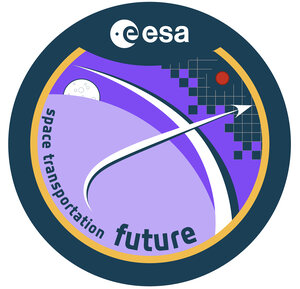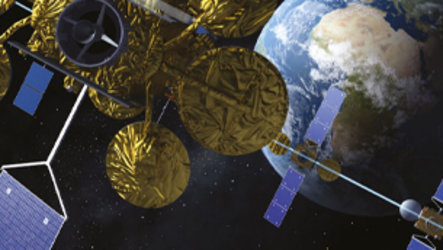More power to Alphabus
The high-power end of the communication satellite market will be better served thanks to Alphabus, Europe’s new telecommunications platform.
Jointly developed by Astrium and Thales Alenia Space under an ESA and French space agency contract, Alphabus is Europe’s coordinated response to the increasing market demand for larger payloads.
Alphabus is already available commercially to handle missions calling for up to 18 kW of payload power, but its range will now be extended to 22 kW.
The contract for this Alphabus Extension programme, signed last week, includes increasing the payload mass from 1250 kg to 2000 kg, boosting the output to an equivalent of more than 1000 TV channels and raising the thermal rejection capacity to 19 kW from 11.5 kW.
The programme also provides opportunities for Europe’s satcom industry to develop key satellite communications technologies, such as a deployable panel radiator for increased heat dissipation and an ultra-stable antenna module for future very large Alphabus satellites.

“After the qualification of Alphabus, the Extension programme will put Europe at the forefront of the worldwide satcom market,” said Magali Vaissiere, ESA Director of Telecommunications and Integrated Applications.
“The Alphabus platform is already available for our offers addressing the high-power market, and the first satellite is in the final integration stage,” said Arnaud de Rosnay and Emmanuel Grave speaking on behalf of the industrial consortium of Astrium and Thales Alenia Space.
“Now with the extension in Alphabus capacity, we will be able to further extend our offer, beyond any other product available in the worldwide market.”
A wide range of commercial payloads to provide TV broadcast, Internet access and mobile and fixed telecommunication services can be accommodated on Alphabus.
Alphasat, a public–private partnership between ESA and Inmarsat, is the first satellite to use the Alphabus platform. Its new generation of advanced geomobile communications payload will augment Inmarsat’s Broadband Global Area Network service, enabling communications across Europe, Asia, Africa and the Middle East with increased capacity.
Launch is planned for late 2012 on Ariane 5 from Europe’s Spaceport in Kourou, French Guiana.
For more information, see the links in the column to the right.















 Germany
Germany
 Austria
Austria
 Belgium
Belgium
 Denmark
Denmark
 Spain
Spain
 Estonia
Estonia
 Finland
Finland
 France
France
 Greece
Greece
 Hungary
Hungary
 Ireland
Ireland
 Italy
Italy
 Luxembourg
Luxembourg
 Norway
Norway
 The Netherlands
The Netherlands
 Poland
Poland
 Portugal
Portugal
 Czechia
Czechia
 Romania
Romania
 United Kingdom
United Kingdom
 Slovenia
Slovenia
 Sweden
Sweden
 Switzerland
Switzerland




























